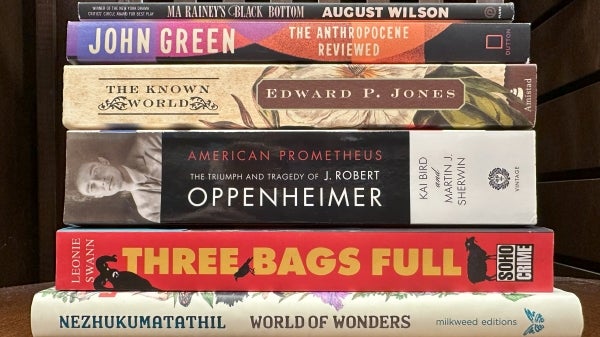Passion for teaching is a family affair

Teaching professors Bethany Bustamante Van Vleet (left) and her mother, Denise Ann Bodman, both teach at the T. Denny Sanford School of Social and Family Dynamics in Wilson Hall on the Tempe campus. Photo by Charlie Leight/ASU News
Denise Bodman and Bethany Bustamante Van Vleet have strong family ties.
Not only are they mother and daughter, they are both teaching professors at Arizona State University in the T. Denny Sanford School of Social and Family Dynamics.
Bodman teaches classes such as “Modern Family Relationships,” and Bustamante Van Vleet teaches and directs the online graduate program in family and human development. They also co-authored the 2024 book “Introduction to Family Processes: Diverse Families, Common Ties,” alongside the late Randal Day, a former professor at Brigham Young University.
They even share an office in the new Wilson Building on ASU’s Tempe campus. But according to Bustamante Van Vleet, most people are unaware of the family connection.
“I never refer to her as ‘Mom’ when we are at work,” said Bustamante Van Vleet. “As a child, I learned that calling out ‘Mom!’ in a store would result in numerous women turning toward me but ‘Denise!’ only resulted in one response. It’s always funny when new colleagues discover that we are mother and daughter, even after several months of working together.”
In honor of National Family Month, which is observed during the five weeks between Mother’s Day and Father’s Day, ASU News sought out their perspectives on family and parenting.
Note: Answers have been edited for length and/or clarity.
Question: Bethany, you teach a class on lifespan development — from conception to adulthood with an emphasis on family influences. How did your family, and specifically your mother, influence you?
A: Families play a powerful and lasting role in a child’s life — they instill values, model how to function in society, lay the foundation for future relationships and help children develop a sense of self.
I am who I am today in large part because of the lessons I’ve learned from my family — especially from my mom. For example, I grew up watching my mom write her dissertation. From that, I learned that education is valuable, knowledge is worth pursuing and I can do and grow from hard things.
I also remember when grocery stores gave out stamps you could collect on cards to earn discounts. I remember sitting on the floor with my mom, licking stamp after stamp — not for our own benefit but so that we could use the cards to buy turkeys for families in need. I’m sure my mom purposefully involved me in that process, in part to teach me what it means to give, to care and to serve.
Q: Denise, what’s different about families today compared to when you started your career — or even when you were growing up?
A: One of the most striking shifts I've seen since I began teaching is the rise in cohabitation. Living together before marriage has become so common, it’s almost a modern rite of passage. However, contrary to what many might expect, it hasn’t led to more successful marriages — in fact, it’s often linked to higher rates of divorce and lower marital satisfaction.
The age at first marriage has also climbed significantly, rising from the early or mid-20s to about 30. This delay is contributing to smaller families and fewer children. At the same time, we’re seeing more people — especially younger adults — choosing pets over kids. These "pet families" often treat animals as full-fledged family members, which may reflect both a desire to care for something and a postponement — or rejection of or practice for — traditional parenting.
Other shifts include a rise in single parents, including those who are single by choice. And of course, technology is reshaping family life in subtle and not-so-subtle ways. From tracking apps to digital distractions, tech has become deeply woven into the fabric of family interactions. One growing concern is "technoference" — the way screens interrupt face-to-face connection. It’s a trend worth watching, as its long-term impact on family dynamics is still unclear.
Despite these shifts, marriage and family are still highly valued in society. In fact, research consistently shows that marriage can bring several benefits, including better physical and mental health, higher life satisfaction, greater financial stability and stronger social support networks.
Q: What lessons have you learned from each other about family through the years, especially as researchers?
Bodman: I’m lucky to work with my daughter and be involved in her family life. What I’ve learned from her large family (six children) is that research can be too clean in its presentation, and parenting is much more complex. However, the essence of loving and responding to children — knowing each one as an individual — cannot be overstated.
Bustamante Van Vleet: As I’ve worked with my mom — personally and professionally — I’ve learned that family and parenting is most effective when approached as a team effort. Building a supportive village is essential — not only for the well-being of children but also for the mental and emotional health of caregivers.
That village might include grandparents and extended family but will also likely include family of choice. My mom has also shown me that parenting evolves. As children grow, so do their needs. If we continue to parent in the same ways without reflection, we risk missing what our children truly need. Parenting is not static — it’s a dynamic, lifelong relationship that requires presence, flexibility and growth.
Q: Bethany, when you think about families that are thriving, what do you see them doing differently?
A: Thriving families are surrounded by support. They are not isolated — they are part of a community network that can meet the various needs of each member of the family.
Thriving families communicate. They take time to share and to listen, which means they also spend time together.
Thriving families also have fun! Fun doesn’t need to mean expensive or complicated — it can be laughing while doing an impromptu dance party in the kitchen or getting stuck in a hole while playing Minecraft with your child. Family fun also requires supporting and exploring the interests of each member of the family, which also supports communication and connection.
Q: Denise, your research highlights the importance of family narratives. Why are family stories so impactful in building resilience and hope?
A: Stories engage both our minds and hearts, making them powerful tools for connection and learning. … For children, knowing their family history — often shared through storytelling — has been linked to stronger identities, better school performance and healthier relationships. The stories families tell and retell weave into a family narrative — one that may reflect and support resilience, hope, service, spirituality, education and facing adversity.
Q: What’s one piece of advice you would share that you believe every family could benefit from?
Bustamante Van Vleet: Find joy in the chaos! A happy family and parenting aren’t a destination. It is easy to look forward to the next thing and put harder things behind us. I get it … I’ve been potty training children as a mom and foster mom for years now, but the “mess” is family and parenting. Family life isn’t the perfect family photo — it’s the moments between those pictures: the challenges, surprises, small accomplishments, hugs, frustration. Part of finding joy in the chaos means creating a community of support, being open to evidence-based resources and strategies and maintaining appropriate expectations of yourself and your family.
Q: You both teach “positive psychology.” How does that impact parenting?
Bodman: Positive psychology focuses on human flourishing and helping individuals reach their full potential. It explores concepts like hope, forgiveness, kindness, optimism, mindfulness, character, happiness, gratitude and resilience. These principles not only shape how we parent but also guide what we teach our children. Additionally, they offer valuable support for parents as they navigate their own daily challenges.
Bustamante Van Vleet: Positive psychology is integral to joyful family life. Research has shown us that these elements of positive psychology led to healthier, happier lives and, by extension, healthier, happier families. The world is hard. Parenting and families can be hard. We don’t need toxic positivity ... but we do need to understand the research and strategies related to positive psychology because it will help create more resilient, fulfilled people in the world, beginning with our own family.
More Arts, humanities and education

More screen time for children this summer may not be a problem
Summer months can mean more screen time for kids who are out of school — and more concerned parents.But according to a recent study co-led by ASU, the time spent on electronic devices may not be as…
ASU team implements offline digital library for orphanage, school in Kenya
Sunlight streamed through the windows of the second-story office, and a gentle wind rustled the curtains.It was 11 a.m. on a May Saturday in the small town of Lumakanda, located in a rural area of…

Cool reads, hot days: Reading recs from ASU’s English department
If you’re looking for book recommendations from folks with serious writing cred, look no further.Faculty from Arizona State University’s Department of English — with its concentration of…
